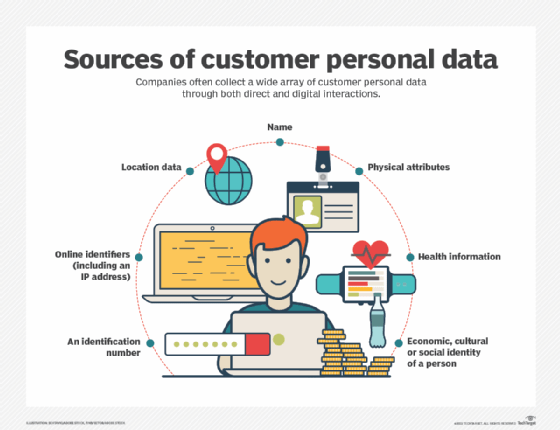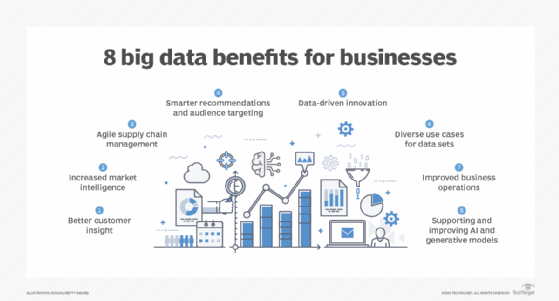data marketplace (data market)
What is a data marketplace?
A data marketplace, or data market, is an online store where people can buy data. Data marketplaces typically offer various types of data for different markets and from different sources. Common types of data sold include business intelligence, advertising, demographics, personal information, research and market data. Data types can be mixed and structured in a variety of ways. Data vendors often offer data in specific formats for individual clients.
Organizations of all kinds, including government, businesses, analysts and market intelligence agencies, use data sold in these marketplaces. Data marketplaces have proliferated with the growth of big data. They've also grown in importance as organizations recognize that they need information from these marketplaces to support informed, data-driven decision-making processes. Data marketplaces are often integrated with cloud services; they have emerging use cases, such as e-commerce, machine learning and blockchain.

How does a data marketplace work?
A data marketplace uses a digital platform to facilitate data transactions among data providers and data consumers. These platforms allow the monetization of data. They also provide data services that simplify the process of locating, procuring and using data.
In data marketplaces, data providers first list their data products or data sets, including information about pricing, metadata and overviews of the data's content. Data providers are often individuals and organizations. Data consumers then browse, acquire or access the data they need, often using self-service capabilities. Consumers often have the opportunity to provide feedback and reviews that help service providers maintain data quality standards.
Benefits of a data marketplace
Data marketplaces have numerous benefits for both data providers and consumers. The most important benefits include the following:
- Users discover and use relevant, high-quality data from multiple external data sources.
- Data providers monetize their data assets and data catalogs.
- Data owners gain insight into consumer needs, guiding better data provision strategies.
- Data discovery from trusted data sources is centralized and streamlined.
- Quality standards for data and reliability are enforced through consumer feedback and reviews.
- Data access and use can be scaled.
- Expenses associated with data collection are reduced, enhancing cost efficiency.

Examples of data sold in data marketplaces
Data marketplaces host an array of data sets catering to diverse needs across industries. Examples of these types of data sets include the following:
- Demographic and firmographic data that provides insights into populations and organizations.
- Transactional and behavioral data that tracks consumer actions and preferences.
- Geographic and geospatial data that supports location-based analysis and planning.
- Social media and internet of things data that offer real-time insights into consumer behavior and device interactions.
- Public and web-scraped data that provides perspectives into public opinion and market conditions.
Well-known examples of data marketplaces include Amazon Web Services Data Exchange, Google Cloud Marketplace, Microsoft Azure Data Market, Oracle Data Marketplace. Other prominent players, according to Grand View Research are Acxiom, Adobe, BattleFin, Datarade, Dawex, Narrative, Quandl, SAP and Snowflake,
Data marketplaces vs. data exchanges
The terms data marketplace and data exchange are often used interchangeably when talking about data management topics. However, they serve different purposes in the data ecosystem.
Data marketplace
Data marketplaces are transactional platforms where data is treated as a product that users buy and sell. A range of user engagement is involved, with the main focus on commercial transactions that let data providers monetize their offerings and data consumers buy the data sets they need to make informed decisions.
Data exchange
Data exchanges are platforms that emphasize data sharing within particular communities and between specific parties. They foster collaboration and mutual benefits through a focus on data democratization and interoperability. These platforms typically aren't public; they usually support secure and efficient data sharing among trusted entities. Healthcare applications are popular use cases.
How do data marketplaces ensure data privacy and security?
The most successful third-party data marketplaces ensure that their platforms are private and secure through multiple layers of protection. Many platforms use data encryption to ensure security of data at rest and in transit. Marketplaces can also use security measures, such as access controls, which define access permissions. Access controls limit who has access to data and what actions they can perform through protocols such as role-based access controls and multifactor authentication.
Application programming interfaces are commonly used to ensure security with their authentication protocols, such as API keys, to protect data access. Data governance initiatives help maintain data security and privacy by providing guidelines on data ownership and regular data audits. Data marketplaces also must adhere to data compliance regulations. They enforce stringent data handling practices, ensuring that data is protected and private.
Data marketplaces help organizations monetize data and optimize its use. Learn why companies are still struggling to build modern data platforms.
